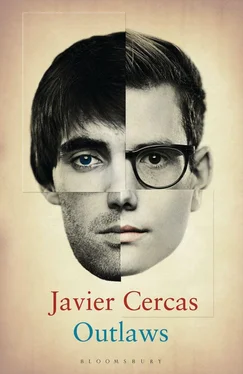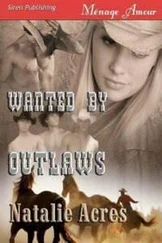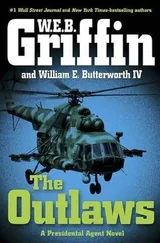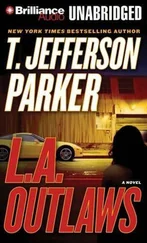‘The other day you told me that your relationship with Tere didn’t change after sleeping with her on the beach at Montgó.’
‘And it’s true. I thought it would change (or I should say: I would have liked it to change), but it didn’t change. Of course we didn’t sleep together again. Nor did we talk more than before or become more involved with each other than before or closer. In fact, I’d almost say that, instead of improving, our relationship deteriorated: Tere even stopped flirting with me, like she used to do sporadically; and if I got up my courage to get down off the barstool and out onto the dance floor at Rufus and started dancing beside her as I’d done at the Marocco, the night of Montgó beach, her response was always cold, and I soon gave up and swore never to try again. I didn’t know what to attribute her disinterest to, and I never dared ask her or remind her of what had happened on Montgó beach (just as I’d never dared to remind her of what happened in the arcade washrooms). Of course, Guille’s death and Chino, Tío and Drácula’s arrest might have had some bearing; the appearance of the weapons might also have had some bearing and the fact that with them everything became rougher, more serious and more violent, as if that change had isolated us more and made us become more introverted and more aware of ourselves, or more grown-up. In any case, just as I never had the impression that Tere regretted what happened between us in the arcade washrooms, now I did have the impression that she regretted having slept with me on Montgó beach.’
‘And in spite of that it never occurred to you to think that Tere had slept with you to get even with Zarco, because that night he went off with another girl.’
‘No: I already told you the last time we talked. It didn’t occur to me then. But by then I no longer thought that Tere was Zarco’s girlfriend. Or I didn’t exactly think she was. I thought she was his girlfriend but not his girlfriend, or that she was his girlfriend but in an elastic and occasional way, or that she had been his girlfriend and wasn’t any more but might be again or he thought she might be again. I don’t know. I told you before that I’d never seen them behaving like a couple, never seen them kissing, for example, although I had seen Zarco, especially very late at night, at Rufus, trying to kiss or caress Tere and her pushing him away sometimes with irritation and sometimes with an amused or even affectionate gesture. Anyway. The truth is I didn’t really understand too well what the relationship was between them, and I wasn’t interested in understanding it either.’
‘Do you know if Zarco found out that summer about what happened in the arcade washrooms between you and Tere?’
‘No.’
‘He didn’t find out or you don’t know if he found out?’
‘I don’t know if he found out.’
‘Do you know if he found out that you and Tere slept together on Montgó beach?’
‘Yeah. He did find out about that. I know because he told me himself, in the conversation I was just telling you about, a couple of weeks after the night on Montgó beach. That afternoon, like I said, we’d called off a heist. It was in Figueras or in some town on the outskirts of Figueras. We called it off at the last minute, when we were just about to go into the bank and a Civil Guard car drove past and we had to buzz off. The escape lasted for quite a while, because for quite a while we feared we’d been identified and that they were following us. Actually I think we only calmed down when our car was travelling under the mid-afternoon sun on a mountain road that snaked between hillsides divided by low stone walls and covered by pines, olive trees, prickly pears and shrubs. After a while we came to a town of white houses crowded together in front of the sea that turned out to be Cadaqués. We wandered the streets drinking beer in the bars along the boardwalk, and when we came out of one of them I saw a brand-new Citroën Mehari and hot-wired it with Zarco and Gordo’s permission and then, with Zarco beside me and Gordo and Tere in the back seat, drove out of Cadaqués with no intention other than to enjoy the ride.
‘I drove along the edge of the sea northwards and passed a couple of pebble beaches and a fishing village. The road got emptier and narrower and the surface more irregular and full of potholes. The wind coming in off the sea threatened to blow the top off the Mehari, and at some point (by then it had been a while since we’d seen any other cars) the road ran out, and became almost a dirt track or a half-paved track. Where are we going? Zarco asked. I don’t know, I said. Zarco was sunk down in the passenger seat, with his bare feet resting on the dashboard; I thought he was going to tell me to turn around but he didn’t say anything. In the back seat, Tere and Gordo hadn’t even heard Zarco’s question, and didn’t look impatient but rather exhausted or bewitched by the silence and desolation of that suddenly lunar landscape: a plateau of slate, grey crags and dry bushes in which only here and there, between bare gullies and rocks, did we get a glimpse of the sea. I carried on avoiding rough patches until at the end of the track I caught sight of a headland crowned by a lighthouse and beyond it an expanse of water almost as big and as blue as the sky.
‘We had ended up at Cap de Creus. None of us knew it, of course, but that was where Zarco and I had that conversation I was telling you about. We passed in front of an abandoned hut, climbed up to the headland and I parked the Mehari by the lighthouse, a rectangular building with a tower rising out of it with a cupola of iron and glass, topped by a weathervane. When we stopped we realized that Tere and Gordo had fallen asleep. We didn’t wake them up, and Zarco and I got out of the car and started walking along the esplanade in front of the lighthouse until the esplanade ran out and in front of us was nothing but a precipice that descended to a labyrinth of coves and inlets and, beyond them, a sea that stretched to the horizon, wavy and open and a little bit shadowed already by the beginning of twilight. Both of us stood there, our faces to the wind. Zarco murmured: Fuck, it looks like the end of the world. I didn’t say anything. After a while Zarco turned around, walked away from the cliff, went and sat down against the wall of the lighthouse and started rolling a joint out of the wind. I walked away from the cliff too, sat down beside Zarco, lit the joint when he’d finished rolling it.
‘That’s where the conversation started up. I don’t remember how long it lasted. I remember that when we started talking the sun was starting to set, staining the surface of the sea a pale red, and that on the right a boat appeared on the horizon sailing parallel to the coast, and when we left, the boat was about to disappear on the left of the horizon and the sun had sunk into the now dark water; I also remember how the conversation got started. We’d been sitting there for a while not talking when I asked Zarco what he was thinking of doing when summer was over; I’d asked the question most of all to escape from the uncomfortable silence, and it sounded a little incongruous, a little out of place, so Zarco brushed it off saying he’d do the same as always, and half-heartedly asked what I’d do. As well as half-hearted, my answer was innocuous — I said I’d do the same as always too — but it seemed to arouse Zarco’s curiosity. And what do you mean by that? he asked. That you’re going back to school? It means I’ll do the same as this summer, I answered. I don’t plan to go back to school. Zarco nodded as if he approved of the answer and took a pensive toke. I stopped going to school when I was seven, he said. Well, maybe eight. Doesn’t matter: it was a pain. You don’t like it either? No, I said. I used to like it, but not any more. What happened? asked Zarco. At that moment I hesitated. I told you before that I’d never mentioned Batista in front of Zarco and the rest; now, for a second, I thought I might; the next moment I discarded the idea: I felt that Zarco wouldn’t be able to understand, that telling him about my previous year’s ordeal would be to relive it, relive the humiliation and lose the self-respect I’d gained over the summer and force Zarco to lose respect for me. Then, with a blend of amazement and joy, I thought how, although the ordeal had happened just a couple of months ago, it was now as though it had happened centuries ago. Then I said: Nothing. I just stopped liking it and that was it.
Читать дальше












